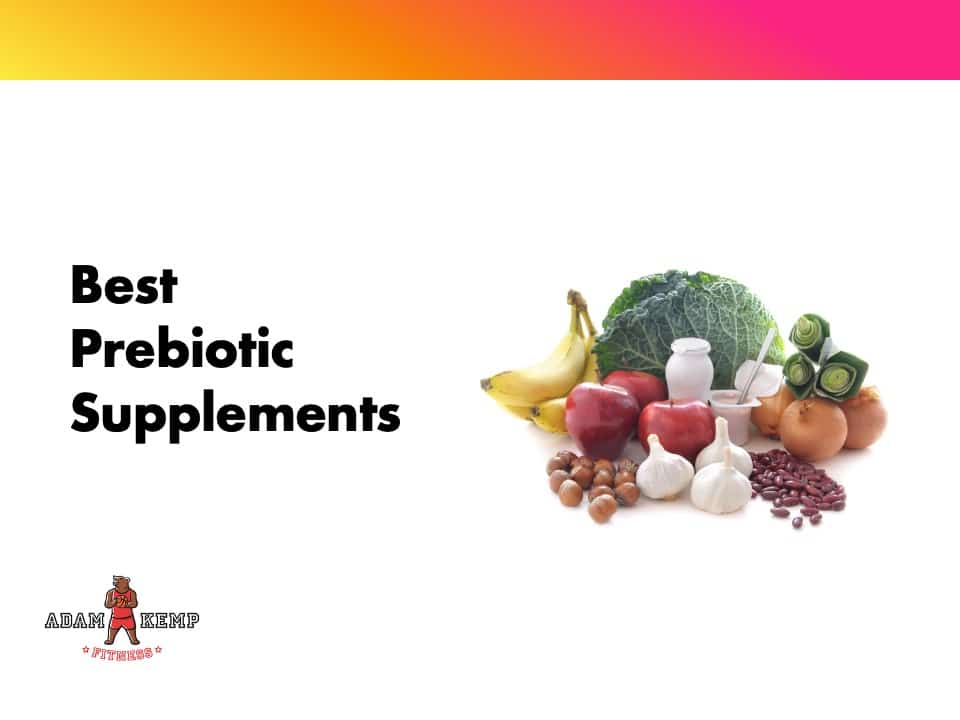5 Best Prebiotic Supplements | Prebiotic Supplement Reviews
Taking one of the best prebiotic supplements reviewed in this article is a great decision for your digestive health.
Prebiotic fiber, a type of dietary fiber, plays a crucial role in promoting human health by nourishing beneficial gut bacteria.
This indigestible fiber acts as a food source for these bacteria, enhancing gut health and supporting various bodily functions, and a healthy gut microbiota is linked to improved digestion, enhanced immune function, and may even impact mood and cognitive health.
For these reasons, incorporating prebiotic supplementation into your diet can offer several health benefits.
Why Should You Consume Prebiotic Supplements?
Prebiotics are a type of dietary fiber that functions as food for beneficial gut bacteria, helping to foster a healthy microbiome.
The gut microbiome, comprising trillions of bacteria, is integral to various bodily functions, including digestion, immune system function, and even mental health.
Prebiotics, found naturally in foods like garlic, onions, and bananas, are not digestible by humans but are fermented by gut bacteria, leading to beneficial changes in the gut flora composition.
Prebiotic supplements typically contain inulin, fructooligosaccharides (FOS), or galactooligosaccharides (GOS), which are selectively fermented by gut bacteria.
- Inulin: Found in chicory root, inulin increases beneficial bacteria in the gut, aiding in digestion and bowel regularity.
- Fructooligosaccharides (FOS): Derived from fruits and vegetables, FOS supports gut health and may help improve mineral absorption.
- Galactooligosaccharides (GOS): Extracted from lactose, GOS is known to boost beneficial bacteria, particularly Bifidobacteria.

By boosting the growth of beneficial bacteria, prebiotics can improve digestive health, enhance nutrient absorption, and may even help regulate blood sugar levels.
Furthermore, the synergy between prebiotic and probiotic supplements, termed “synbiotics”, further enhances gut health.
Probiotics introduce beneficial bacteria to the gut, while prebiotics provide the necessary nutrients to sustain these bacteria.
This combination can lead to a more balanced gut microbiome, potentially offering greater health benefits than either supplement alone (Pandey et al., 2015).
Given the integral role of gut health in overall wellness, the use of prebiotic supplements can be a proactive step towards maintaining and improving health.
Benefits of Prebiotic Supplementation
- Enhanced Digestive Health: Prebiotics help regulate bowel movements and can alleviate symptoms of constipation and diarrhea (Manning & Gibson, 2004).
- Boosted Immune Function: A healthy gut microbiome, supported by prebiotics, plays a crucial role in maintaining the immune system, potentially reducing the incidence of infections and inflammation (Gibson & Roberfroid, 1995).
- Improved Nutrient Absorption: Prebiotics can enhance the absorption of minerals like calcium and magnesium, important for bone health (Scholz-Ahrens & Schrezenmeir, 2007).
- Weight Management: Some studies suggest that prebiotics can aid in weight management by promoting satiety and reducing appetite (Parnell & Reimer, 2009).
- Mental Health Benefits: Emerging research links gut health to mental health, with prebiotics potentially playing a role in alleviating symptoms of depression and anxiety (Schmidt et al., 2015).
While prebiotic supplements offer numerous health benefits, they are not a one-size-fits-all solution.
Individual responses can vary, and in some cases, prebiotics may cause gas or bloating, particularly when first introduced to the diet. It’s advisable to start with smaller doses and gradually increase intake.
Additionally, integrating a variety of prebiotic-rich foods into the diet can provide similar benefits to supplementation.
Moreover, prebiotic supplements and prebiotics found in whole foods both play a vital role in promoting gut health, yet they offer distinct advantages and disadvantages.
Here are a few specific benefits of prebiotic supplements compared to consumping prebiotics solely through whole foods:
- Concentration and Consistency: Supplements provide a concentrated dose of prebiotics, ensuring a consistent intake level, which can be beneficial for targeted therapeutic purposes (Manning & Gibson, 2004).
- Convenience: For individuals with busy lifestyles or limited access to a variety of fresh produce, supplements offer an easy and convenient way to ensure adequate prebiotic intake.
- Specificity: Supplements often contain specific types of prebiotics that may not be readily available or abundant in normal diets, allowing for targeted gut health support.
Disadvantages of Prebiotic Supplements
Although there are many benefits of taking prebiotic supplements, there are some negatives as well.
Here is a look at the downsides of taking prebiotic supplements
- Limited Nutritional Profile: Unlike whole foods, supplements do not provide the broad range of nutrients (like vitamins, minerals, and antioxidants) that contribute to overall health (Slavin, 2013).
- Potential for Side Effects: High doses of prebiotics from supplements can lead to discomforts such as bloating, gas, or diarrhea, especially when first introducing them to the diet.
- Cost: Supplements can be more expensive than obtaining prebiotics from whole food sources.
Advantages of Whole Food Prebiotics
- Nutritional Diversity: Whole foods rich in prebiotics also contain a variety of other nutrients that contribute to overall health, such as fiber, vitamins, and minerals (Slavin, 2013).
- Natural Balance: The prebiotics in whole foods are balanced with other dietary fibers and nutrients, which can mitigate potential digestive side effects.
- Dietary Integration: Consuming prebiotics as part of a varied diet promotes overall healthy eating habits and can be more enjoyable due to the variety of flavors and textures in foods like garlic, onions, and bananas.
Disadvantages of Whole Food Prebiotics
- Inconsistency in Intake: The amount of prebiotics in whole foods can vary widely, making it challenging to achieve a consistent therapeutic dose.
- Limited Options for Some Diets: Individuals with certain dietary restrictions or preferences may find it challenging to consume a wide variety of prebiotic-rich foods.
- Preparation and Access: Fresh produce requires preparation, and consistent access to a variety of fresh, high-quality prebiotic-rich foods may be challenging for some individuals.
While prebiotic supplements offer convenience and a targeted approach to gut health, whole food sources provide a broader range of nutritional benefits and natural balance.
The choice between the two should be based on individual health goals, dietary preferences, and lifestyle considerations.
Top 5 Prebiotic Supplements (2024)
After analyzing a large amount of prebiotic supplements, here are my top 5 options:
1.) Dr. Tobias Prebiotics
In my opinion, the best prebiotic supplement is Dr. Tobias Prebiotics:
I believe Dr. Tobias Prebiotics is the best prebiotic supplement because the prebiotics in this supplement have been studied and proven safe and beneficial. Dr. Tobias Prebiotics contain four prebiotics, which are:
- LH01 – Myoviridae
- LL5 – Siphoviridae
- T4D – Myoviridae
- LL12 – Myoviridae
This combination is trademarked as PreforPro.
According to an initial study on PreforPro that was published by the Journal of the American College of Nutrition,
“Consumption of therapeutic doses of a mixture of 4 bacteriophages was both safe and tolerable in a target human population.”
According to another study, which was published in Nutrients,
“bacteriophage consumption caused minimal disruption to the gut microbiota, but did elicit minor changes that may be viewed as beneficial overall.”
There are certainly other quality prebiotic supplements, but because of the research conducted on PreforPro, I believe Dr. Tobias Prebiotics is the best prebiotic supplement.
Last update on 2025-04-15 / This article includes affiliate links/Images via Amazon Product Advertising API. I may earn commissions on purchases made through these links.
2.) Hyperbiotics Organic Prebiotic Powder
If you prefer to use a powder instead of taking capsules, Hyperbiotics Organic Prebiotic Powder might be the best prebiotic supplement for you!
Hyperbiotics Organic Prebiotic Powder contains a blend of a few of the best prebiotic foods, including:
- Organic Acacia Fiber
- Organic Jerusalem Artichoke Fiber
- Organic Green Banana Flour
This is a simple, effective, and affordable prebiotic supplement.
Last update on 2025-04-15 / This article includes affiliate links/Images via Amazon Product Advertising API. I may earn commissions on purchases made through these links.
3.) Zenwise Health Digestive Enzymes
Zenwise Health Digestive Enzymes combines both probiotics and prebiotics, as well as additional digestive enzymes for maximum absorption and effect.
Along with various probiotics and prebiotics, Zenwise Health Digestive Enzymes also contains a few additional herbal extracts:
- Papaya Powder
- Apple Pectin
- Ginger Root Powder
- Turmeric
- Fennel Seed Powder
- Peppermint Leaf Extract
Last update on 2025-04-15 / This article includes affiliate links/Images via Amazon Product Advertising API. I may earn commissions on purchases made through these links.
4.) Bulletproof InnerFuel Prebiotic
Created by the makers of the famous Bulletproof Coffee revolution, Bulletproof InnerFuel Prebiotic is a unique prebiotic supplement that provides 17g of prebiotics per serving!
Bulletproof InnerFuel Prebiotic is made with a unique plant-based prebiotic powder named Larch Arabinogalactan Larch Arabinogalactan is a natural immune system booster made from the bark and wood of the Larch tree.
The natural fibers of the Larch tree also contain free-radical fighting polyphenols.
Last update on 2025-04-15 / This article includes affiliate links/Images via Amazon Product Advertising API. I may earn commissions on purchases made through these links.
5.) KOS Organic Inulin Powder
For a very simple and very affordable prebiotic supplement, KOS Organic Inulin Powder is your best option. Inulin is a naturally unflavored prebiotic powder and it is a simple form of prebiotics you can take each day to improve your digestive health.
Last update on 2025-04-15 / This article includes affiliate links/Images via Amazon Product Advertising API. I may earn commissions on purchases made through these links.
Final Thoughts: Should You Take a Prebiotic Supplement?
Taking a prebiotic supplement is a great way to intake more prebiotics.
Although you should try to consume prebiotic-rich foods as much as possible because they contain additional vitamins and minerals that you will not get from prebiotic supplements alone, prebiotic supplements are a valuable addition to a healthy diet.
Read Next: Best Prebiotic Food and Supplement Sources








